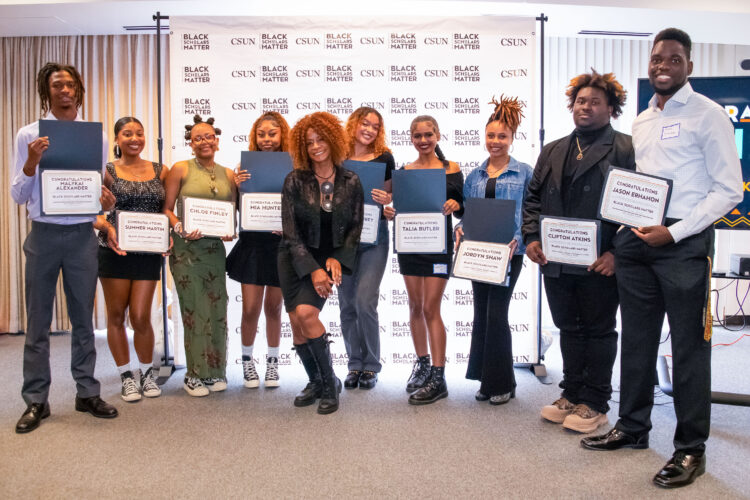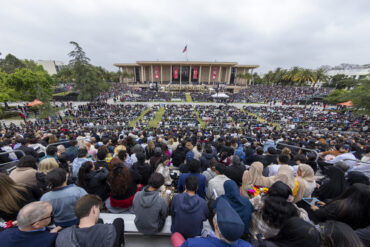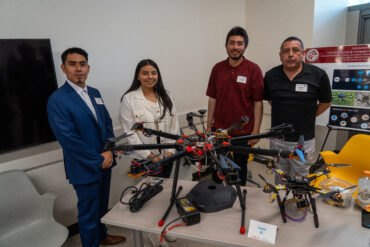
In just a few short months, campus will welcome thousands of incoming first-time freshmen for the fall 2024 semester. Among them will be 12 students who make up the third cohort of the Black Scholars Matter (BSM) program.
Their first days of school are the culmination of months of consideration and engagement— to bring Black students to CSUN and support them throughout their college years to graduation. The scholars are selected from three Los Angeles-area high schools: Alexander Hamilton, Birmingham Community Charter and William Howard Taft Charter. The freshmen will join 18 other students from the first two cohorts.
The Black Scholars Matter program is directed by Theresa White, professor of Africana Studies, Faculty Senate vice-president, and co-chair of the Black Student Success Council (BSSC). She has been with the program since its beginnings when it partnered with the Bridge to the Future program, which recruits students from Canoga Park High School.
Students who are accepted to the BSM program attend CSUN tuition-free through university grants, Cal Grants, BSM awards or other means, depending upon their family’s financial profile. The students also have their mandatory university fees covered. They receive services and support, while enrolled in the program. The BSM program helps students get oriented, prepare for university life, find on-campus work, internships and resources. It offers a holistic eco-system of academic, social, emotional, mentorship and tutoring support from the first day of school to graduation. Each Friday, cohort members and the BSM Empowerment Squad gather for workshops or “empowerment sessions” on topics ranging from entrepreneurship to mindfulness.
Shortly before a May 4 ceremony to welcome the third cohort’s scholars, White spoke with CSUN Newsroom about the program, how it works and her hopes for its future growth.
Note: this interview has been edited and condensed.
How does the recruitment process work?
Theresa White: We start having conversations with the students in the 11th and 12th grades, so it creates a really strong pipeline. Of course, they have to be accepted to CSUN. I track the students from the moment they express interest to the time that they submit their intent to register and beyond. We look at the Black Scholars Matter (BSM) applicants from a holistic standpoint during the application review process. We invite the students to express themselves in a variety of ways.
There are several opportunities for them to do that: There’s the standard essay application. Then, we also have the virtual interview, where we have CSUN partners participate in that process. The students are interviewed by two individuals. Then, we also have a portfolio option, so students can express themselves creatively. There are also letters of recommendation — an academic letter of recommendation and community-engagement letter of recommendation, as we are looking for students who have volunteered and given back to their communities.
We offer workshops about how to fill out the application, and how to complete their portfolio. We also have mock interviews, to help them understand what interviewing is like, and how to express themselves confidently. We offer workshops to the high school counselors, members of the Black Student Academic Program (BSAP) and administrators. We also facilitate, in collaboration with CSUN financial aid representatives, financial aid workshops with the parents, so they understand the FAFSA and the steps to take for successful completion. The outreach effort is really focused and intentional.
Once that application process is complete, then we have a team of individuals, our partners, who look at those applications. We say, well, let’s look at how the student did in the interview. Let’s look at their essay. What did they write? What are they saying? What did the counselor say about them? And then, that’s when the decision is made to bring them on board.
What can students expect from the program?
Theresa White: We have an acronym called MIPS: mental, intellectual, physical and spiritual. That’s our thematic approach, a holistic ecosystem that we’ve created.
We have end-of-the-week Empowerment Sessions that focus around all those things. We have discussions about how to study and not procrastinate. We also have mindfulness sessions; we go to the Oasis Wellness Center and participate in yoga classes, or we have a speaker come in from the David Nazarian College of Business and Economics and talk about entrepreneurship. We have our partners come from the CSUN Career Center to talk about career trajectories and working on resumes and cover letters, interviewing and internships. We have some physical fitness activities, where we participate in outdoor adventures. We try to spend time outdoors, and also have celebratory activities around cultural holidays, such as Kwanzaa and Black History Month. We will have activities this year centered around voting and the election. The students are also expected to participate in community engagement (volunteering), 10 hours a semester — we have curated a whole list of things that they can do in the areas of Health and Wellness; Environmental Justice; Arts and Culture; Education and/or Political and Social Justice.
They are also expected to give back to scholars who are coming up behind them. So, for instance cohort 1 curated a couple of the end-of-the-week empowerment sessions for cohort 2. And cohort 2 will do it for cohort 3.
What’s the future for Black Scholars Matter? What kind of growth do you want to see?
Theresa White: I took some steps last year because the first year, I had promised students that they would get the kinds of support that they needed to be successful. There were several students who were very interested in pursuing engineering, and of course a series of math classes is required. So, my job was to find the math tutors, and specifically a culturally relevant math tutor, who could support them. The next year, I applied for a grant and created a program to recruit students of African descent who had done really well in a series of entry-level math classes. In partnership with the campus Learning Resource Center and the math department, we created a program where we brought in students of African descent to participate in a culturally relevant math tutor training program, where they earned a math tutor certificate, which made them eligible for securing positions as math tutors in the LRC, Math Department or with the BSM program.
For the future, I hope the university will have an ongoing budget line item to support this program, moving forward indefinitely. That … and more resources. I could use an assistant director, more staff, student assistants and space in order to help scale up this program. I feel that it is a model for success.
If I was able to find a donor to support on-campus housing and a meal plan for these students, that would be a change-maker. Transportation to campus is also a huge factor in retention.
How do you want students in the program to feel? What do you want them to get out of Black Scholars Matter?
Theresa White: I want the students to feel like they belong. That’s really key, because in my experience, working with students in general, and working with Black students in particular, there is a lack of a feeling of belonging. Number one, we all know that there’s not very many people, students, staff or faculty, that look like them on our campus. This is especially true if you’re a STEM (science, technology, engineering, math) major.
Also, I want them to feel empowered, to feel that they matter, and their voice counts. I want to be sure they have a voice. If they don’t have it, I’m going to help them find it.
I want them to explore their interests without feeling a lot of pressure. College is already stressful. I want them to be in a space where they feel whole and empowered. We’re creating a village, a dynamic village that is built upon Black excellence.




Comments are closed.